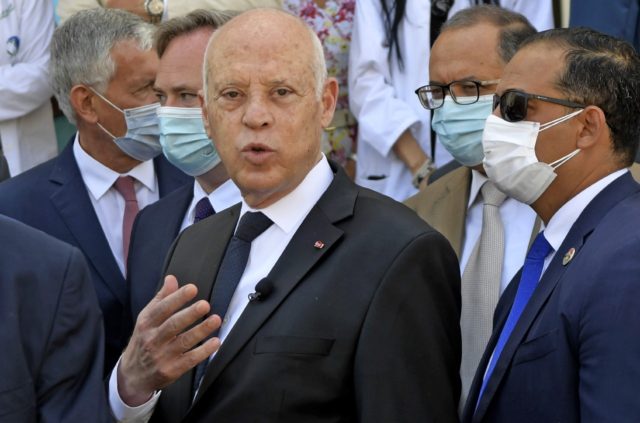Tunisian President Kais Saied was a political newcomer when he won a 2019 landslide victory, an austere legal academic who was determined to revolutionise the political system through the law.
This week he set the North African nation onto an uncertain path after a power grab ousting the premier and suspending parliament on Sunday, with the former law lecturer presenting himself as the ultimate interpreter of the constitution.
Saied rode a wave of popular support to power, amid bitter frustrations at the failure of the political elites since the 2011 revolution that ousted dictator Zine El Abidine Ben Ali.
Slender, white-haired and usually dressed in a sombre and sharp-cut business suit, the 63-year-old has shown little inclination to negotiation or compromise, even in the midst of the country’s social and health crises.
Difficult to politically classify, he is conservative on social issues, including being opposed to equality between men and women in matters of inheritance, or to the abolition of the death penalty.
Yet he is also in total opposition to the Islamist-inspired Ennahdha party, which was the strongest group in the coalition government, and which labelled his shock move a “coup d’etat”.
‘Ambiguous’
Saied, who was at the Tunis faculty of judicial and political sciences for nearly two decades, has demanded a complete overhaul of the government system — in strict compliance with his views of the law.
In January, he refused to receive the oath of ministers, believing corruption allegations they faced prevented him from doing so.
Before his 2019 election — in which he took nearly three-quarters of the vote — he was mainly known for his legal analysis as a television commentator during the drafting of a new constitution.
Critical of the parliamentary system and the partisan compromises it requires, Saied has hammered home a vision of a radical decentralisation of power.
He advocates the election of local councils, appointing representatives who can be dismissed during their mandate, arguing it will help the will of the people to reach central power, and to put an end to corruption.
The International Crisis Group think tank calls Saied the “leading representative” of a “new wave of ‘sovereignist’ politicians”, which emerged amid an economic crisis and mounting pressure from international donors.
“His ideological tendencies have remained ambiguous,” the ICG wrote in 2020.
“His associates are mainly members of the Islamic left, inspired by Iranian thinkers of the 1979 revolution,” it added.
‘President of hugs’
Born on February 22, 1958, son of a civil servant, he grew up middle class suburb in the south of the capital Tunis, and he has generated an image of a frugal lifestyle.
His wife is a judge, and they have two daughters and a son.
Some of his supporters still address him as “professor” — even though he has few published works and never earned a PhD.
He cultivates an air of old-fashioned formalism, sometimes giving speeches with flourishing rhetoric of formal classical Arabic, while as for official correspondence, he writes letters carefully by hand with traditional calligraphy.
Once, in the run-up to 2019 polls, some dubbed him “Robocop” for his stern manner and conservative demeanour.
But after he was seen sometimes receiving disaffected young people who came to plead their cause, whom he comforts with a big embrace, he earned a new nickname from some — the “president of hugs”.

COMMENTS
Please let us know if you're having issues with commenting.